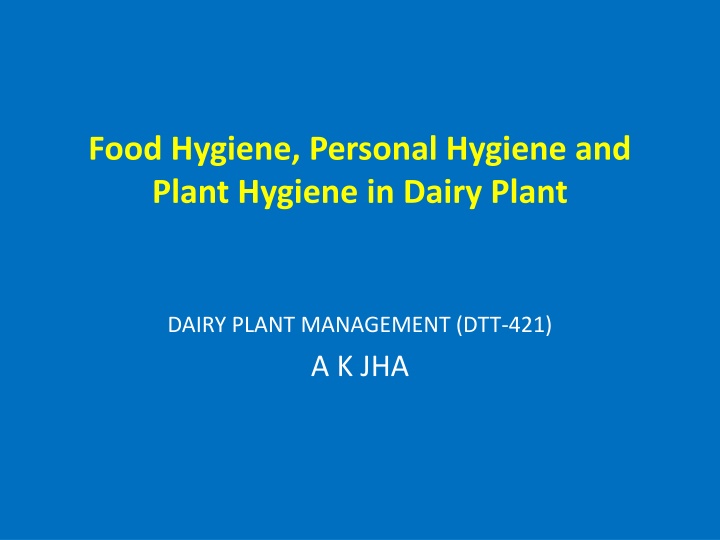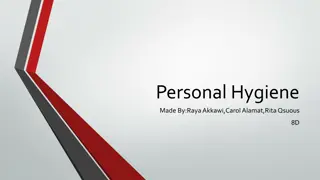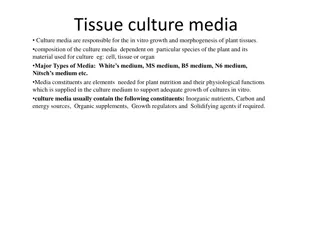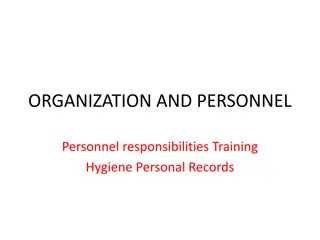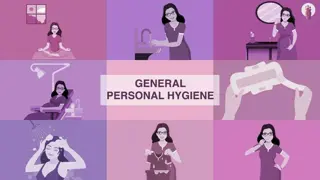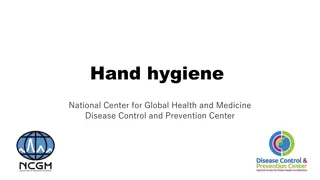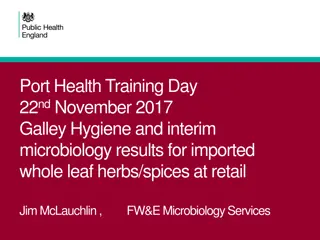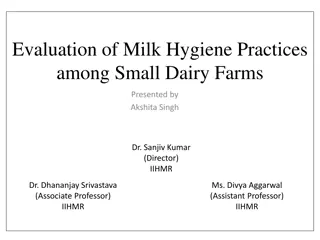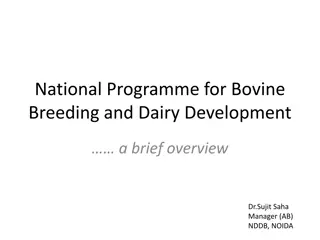Importance of Personnel Hygiene in Dairy Plant Management
In a dairy plant, maintaining good manufacturing practices (GMP) is crucial for ensuring quality and safety of products. This includes emphasizing personnel hygiene, cleanliness, and preventing contamination. Employees must adhere to strict personal hygiene practices, such as proper grooming and wearing hairnets. Hair, beard, and hand hygiene are highlighted to prevent any extraneous matter from contaminating dairy products. Medical checks and guidelines are also outlined to ensure the health and safety of employees and consumers.
Download Presentation

Please find below an Image/Link to download the presentation.
The content on the website is provided AS IS for your information and personal use only. It may not be sold, licensed, or shared on other websites without obtaining consent from the author.If you encounter any issues during the download, it is possible that the publisher has removed the file from their server.
You are allowed to download the files provided on this website for personal or commercial use, subject to the condition that they are used lawfully. All files are the property of their respective owners.
The content on the website is provided AS IS for your information and personal use only. It may not be sold, licensed, or shared on other websites without obtaining consent from the author.
E N D
Presentation Transcript
Food Hygiene, Personal Hygiene and Plant Hygiene in Dairy Plant DAIRY PLANT MANAGEMENT (DTT-421) A K JHA
Introduction Choices and demand for food products are changing. Consumers are more aware and educated. Consciousness about quality is growing. Good manufacturing practices (GMP) is the key to producing quality products. The GMP are designed to: Assist employees to maintain high quality standards and safety of products manufactured and distributed by the dairy plants. Educate employees about correct sanitary practices and Emphasise the importance of personnel hygiene and cleanliness.
Personnel hygiene GMP begins with personal hygiene All employees must maintain a high degree of personal cleanliness It is imperative to prevent dairy products from contamination. To ensure personal hygiene proper grooming is essential. Make sure that No person shall spit, use tobacco, pan masala, chew betel leaves, take food, drink water or consume beverages or store clothing or personal belongings at the places where dairy products are manufactured or utensils, packing materials or ingredients for the preparation of dairy products are stored. No person who is a carrier of disease or who is suffering from any infectious disease, open sore or communicable infection of the skin, shall be engaged in the manufacture of dairy products. In case of doubt the authorized doctor shall check the employee for any illness.
Personnel Hygiene: Hair Hair: Hair is an extraneous matter that be kept out of the product. Hair must be neatly combed. Covering head : A hairnet and / or a cap must be worn at all times. If the hair is not enclosed by a cap, then a hairnet must be worn. No hair pins, bobby pins, hair clips or any other similar clip is allowed to keep a head covering in place. They must be enclosed in the hairnet. Hair extending over the ears or beyond the top of the shirt collar must be protected by a hairnet.
Personnel hygiene: Hair Bump helmets are not considered effective hair restraints and, if worn, an approved hair covering restraint must also be worn underneath. No person should comb their hair at the work place. Men shall preferably be clean shaven. The moustache should be properly covered so that chances of hairs failing in the products do not arise. A neat closely clipped moustache and neat sideburns are permissible if: The moustache is no wider than around outer edge of mouth and extends no longer than the bottom of the mouth. Handlebar style moustache will not be permitted. The sideburns are trimmed no longer than the lobe of the ear. Curved sideburns extending towards the corner of the mouth will not be permitted. Beards are an extraneous matter hazard. Because of the risk of hair loss, any beard must be completely covered and enclosed with a clean, disposable mask.
Personnel Hygiene: Hand Hands: Hands touch products or product packaging all the time and this may become hazardous to the products. Keep hands and finger nails clean. Keep finger nails properly trimmed. Long finger nails are unsuitable in a dairy. Wash hands thoroughly in a hand-washing facility before commencing work and after each absence from the work area. After visiting the rest rooms, toilet, after smoking and at any other time when hands have become soiled or contaminated, employees must wash their hands before returning to their work area.
Personnel Hygiene: Hand In areas designated as critical hygiene areas, hands must be sanitized in the solution provided upon entering the area. Perfumed hand lotions and hand soaps are not permitted. Any person with cuts or unprotected sores on fingers must not start work, but must report to their supervisor and then to the medical centre. Cuts and open sores on fingers must be covered by a colored band-aid type dressing applied by the authorized Medical Officer or an authorized person. Standard flesh colored band-aids or dressings are not acceptable.
Personnel Hygiene: Clothing Clothing: Clothing is provided to protect the product from contamination. Clothing must be clean at the start of production and kept clean during production. Where clothing becomes soiled rapidly, disposable or plastic aprons should be worn over it and changed frequently for additional protection against product contamination. If you work in a very dirty or contaminated area, such as effluent disposal area, change into clean clothes before entering the plant.
Personnel Hygiene: Clothing Pockets above the waist are not allowed. Pockets must be removed or sewn shut to prevent use and to eliminate a product contamination risk. When sweaters are needed, they must be worn under the outer garment to avoid product contamination with loose fibers. Sweaters should be 'short haired (smooth)' close knit and lint-free. Maintain gloves used for handling food and food contact packaging supplies intact and in sanitary condition.
Personnel Hygiene: Clothing Gloves shall be of food grade material. If gloves are worn for handling food and food packaging they must be kept clean and only worn for this purpose. Gloves shall be rinsed in sanitizing solution before handling any product. Hands must be washed and sanitized even though gloves are worn. Do not carry pens, pencils, thermometers, spectacles, tools, etc., in shirts, coats etc., above the belt or waistline, or behind the ear. This would prevent articles from falling into the product. Do not use decorative buttons on shirt or apron. They may fall in product accidentally.
Personnel Hygiene: Jewellery Jewellery: Rings, ear rings, badges, watches and other jewellery must not be worn while on the job because: Hand jewellery cannot be adequately sanitized against bacteria transmission. Jewellery may fall into product. Jewellery is a safety hazard with machinery. Exceptions for Wearing Jewellery: A necklace or chain where applicable worn under a shirt or T- shirt. Small plain sleeper ear rings. A plain wedding band which cannot be removed is the only exception to this requirement.
Personnel Hygiene: Shoes Keep shoes clean, neat and in good condition. Safety boots and shoes should be worn only at the work place and not in any contamination. In critical aseptic areas footbaths must be used by all personnel whenever they are provided. They are an essential part of sanitation procedure. other place to avoid
Personnel Hygiene: Other Habits Other Habits: Smoking is permitted only in authorized areas. Hands must be washed after smoking and before re-entering the production area. Chewing of betel leaves, pan masala and tobacco is permitted only outside the factory premises. Mouth and hands must be washed after chewing and before re-entering the production area.
General safety Measures in Dairy Plants Food or drink is not permitted in the plant. Drinking water is provided at drinking fountains / basins. Maintain lockers clean and free of soiled clothing and food materials to prevent attraction of pests. Avoid uncontrolled, uncovered coughing or sneezing in manufacturing and packaging area.
General safety Measures in Dairy Plants Wear safety goggles where chemical materials are used and handled. Hearing protection must be worn in designated area. They must be kept clean. Do not leave them on equipment surfaces when not in use. Mask should be used in designated areas. Nobody should be allowed to enter production area without wearing the apron and cap. Use of muffler is prohibited in production area.
